
Amrita University is a multi-disciplinary, research-intensive, private university, educating a vibrant student population of over 24,000 by 1700+ strong faculty. Accredited with the highest possible ‘A++’ grade by NAAC, Amrita offers more than 250 UG, PG, and Ph.D. programs in Engineering, Management, and Medical Sciences including Ayurveda, Life Sciences, Physical Sciences, Agriculture Sciences, Arts & Humanities, and Social & Behavioral Sciences. With seven campuses at Amaravati, Amritapuri, Bengaluru, Chennai, Coimbatore, Kochi, and Mysuru and a new upcoming campus at NCR Delhi (Faridabad) and spread over 1200+ acres with 100 lacs square feet of built-up space, Amrita is one of India’s top-ranked private university.

Amrita Vishwa Vidyapeetham has emerged as the seventh best university in the National Institutional Ranking Framework (NIRF) Ranking 2024.
Amrita has been adjudged as one of the “Top 10 Universities in India” for the eighth consecutive year and in the overall category, Amrita secured 18th position.
Amrita School of Medicine, Amrita Vishwa Vidyapeetham, Kochi has ranked 8th Best in India as per the NIRF Rankings 2024.
The list of the best universities are prepared based on various parameters such as teaching, learning & resources, research & professional practices, graduation outcomes, outreach & inclusivity, placement records and perception.The category-wise list of rankings is posted online:
University | Medical | Pharmacy | Overall | Dental | Engineering | Management


Our vision is to be an exemplary Institution that thrives from its commitment to the transformative power of value based education, endowed with technological and pedagogical initiatives, with a special emphasis on health and well-being, that provide the impetus for goal-oriented research for societal benefit and a motivated educational journey, towards a harmonious, prosperous and sustainable future.

Our mission is based on the foundation of three primary principles:
There are two types of education: education for living and education for life. Studying to become a professional is education for a living. On the other hand, education for life requires an understanding of the essential human values. At Amrita, we believe that education should also impart a culture of the heart, based on enduring values and inner strength.
Our motivation to pursue research originated from seeing the suffering around us – poverty, starvation, sickness, environmental pollution and contamination. We believe that if we could transform compassion from a mere word into a path of action, we would be able to solve most of the world’s problems. If we take this step courageously, then our research and its outcomes will have a special beauty, spontaneity, and power. At Amrita, we strongly believe that the culmination of all research should be societal benefit.
At Amrita, we stand united in our mission towards solving globally recognized scientific and societal challenges, including environment, development, and health. Amrita stands at the strategic juncture of two streams of cultures: East and West. It is our vision to bring the two together to bridge the divide through meaningful collaborations with world class universities and innovative approaches that will benefit the entire planet.
Amrita's culture of education equips students to be rooted in the values of Dharma (righteousness), Karuna (compassion) and Shraddha (mindfulness). Endowed with qualities of acceptance, patience, self-confidence, perseverance and enthusiasm, the benefit of humanity will become uppermost in their thought, word and action. They will then pioneer innovative solutions for the benefit of all humankind, leading to sustainable health and prosperity for all. This resonates with the ancient Sanskrit prayer 'Lokah Samastah Sukhino Bhavantu'. It is a reminder of our deeper connection to the entire world around us, “May our work contribute to the happiness of all beings.”

Amrita Vishwa Vidyapeetham was the youngest institution to be awarded with an 'A++' grade by the National Assessment and Accreditation Council (NAAC), an autonomous body established in 1994 by the University Grants Commission (UGC) of India to assess and accredit institutions of higher education in the country. To be eligible to apply for the NAAC accreditation, an educational institution should have completed five years. Amrita Vishwa Vidyapeetham had just completed six years in January 2009 when it applied for the accreditation. 'A++' is the highest grade that can be awarded to the best-in-class institutions for higher learning.
Criteria 1 : Curriculum Aspect
Criteria 2 : Teaching-learning and Evaluation
Criteria 3 : Research, Innovations and Extension
Criteria 4 : Infrastructure and Learning Resources
Criteria 5 : Student Support and Progression
Criteria 6 : Governance, Leadership & Management
Criteria 7 : Institutional Values and Best Practices
Institutional Information for Quality Assessment (IIQA)
IQAC AQAR Guidelines (Feb 2021)
NAAC University Manual (Feb 2020)
Faculty at Amrita are highly qualified and come with international training from countries all around the globe. Amrita exemplies committment towards students with all learning capabilities, tailoring the courses so that no student is left behind.
As a result of the above initiatives, the pass percentage of students is 95% and the demand ratio for the last five years has risen to an impressive 8.0.
Amrita exemplifies interdisciplinary research, and research that translate to societal benefit to help build a sustainable world. This commitment has helped Amrita raise substantial funds. As evidenced below this has brought recognition and success to its research activities.
At Amrita, the delivery of teaching-learning is facilitated by the development and establishment of world-class facilities integrated with digital technologies, including well-furnished classrooms, state-of-the-art laboratories and ubiquitous computing facilities, as well as excellent sports and recreational facilities.
Amrita campuses are a result of meticulous planning and execution:
Amrita values students as its most important stakeholder, and the future wealth of our society, Amrita mentors, supports and encourages all students to reach their highest potential through various schemes as identified below.
Leading the academic and administrative governance is world renowned humanitarian leader Sri Mata Amritanandamayi Devi (AMMA). Amma has been a relentless supporter of education, innovation and research towards upliftment of society.
The University’s Governing Body which is the Board of Management (BoM) steers the policies and practices of the University to strongly promote Education for Life for students of all disciplines. The governance empasizes decentralized decision-making at all levels of the university to encourage empowerment through participation in governance.
Amrita's emphasis on value-based education is its foundational core and every student is exposed to the fundamental principle of values as a defining part of success in all spheres of activity in this world. Amrita’s Institutional Values and Best Practices can be summarized as follows:
| Sl. No. | Name | Designation |
|---|---|---|
| 1 | Dr. P Venkat Rangan | Vice Chancellor - Chairman |
| 2 | Swami Abhayamritananda Puri | Pro-Chancellor - Honorary Chairman |
| 3 | Dr. K. Sankaran | Registrar - Member |
| 4 | Prof. C Parameswaran | Director CIR - Member |
| 5 | Shri. Venugopal | Director HR - Member |
| 6 | Dr. Prem Nair | Medical Director - Member |
| 7 | Swami Sankaramritananda Puri | Director, School of Ayurveda – Member |
| 8 | Br. Viswamrita Chaitanya | Director, Bangalore Campus - Member |
| 9 | Br. Devidasa Chaitanya | Director, Amritapuri Campus - Member |
| 10 | Dr. U Krishnakumar | Director, ASAS Kochi - Member |
| 11 | Br. Anantananda Chaitanya | Director, Mysore Campus - Member |
| 12 | Shri. I B Manikantan | Director, Chennai Campus - Member |
| 13 | Dr. R Dhandapani | Controller of Examinations - Member |
| 14 | Dr. Shanti Nair | Dean, Research - Member |
| 15 | Dr. Sasangan Ramanathan | Dean, Engineering - Member |
| 16 | Dr. V S Somanath | Dean, Management - Member |
| 17 | Dr. Bipin Nair | Dean, School of Biotechnology - Member |
| 18 | Dr. Maneesha Ramesh | Dean, International Programmes - Member |
| 19 | Dr. Krishnashree Achuthan | Dean, PG Programs - Member |
| 20 | Dr. Balakrishnan Shankar | Associate Dean, Amritapuri - Member |
| 21 | Dr. Kishore Pillai | Associate Dean-Management - Member |
| 22 | Dr. S N Jyothi | Principal, ASE, Amritapuri - Member |
| 23 | Dr. P Shankar | Principal, ASE Chennai - Member |
| 24 | Dr. Sriram Devanathan | Principal, ASE, Bangalore - Member |
| 25 | Dr. (Col) Vishal Marwaha | Principal, School of Medicine - Member |
| 26 | Dr. R Balagopal Varma | Principal, School of Dentistry - Member |
| 27 | Prof. K T Moly | Principal, College of Nursing - Member |
| 28 | Dr. M Sabitha | Principal, School of Pharmacy - Member |
| 29 | Dr. P Sureshkumar | Principal, School of Agriculture Sciences – Member |
| 30 | Dr. V M Nandakumaran | Principal, ASAS Amritapuri - Member |
| 31 | Dr. Ravindranath G | Principal, ASAS Mysore - Member |
| 32 | Dr. A V Shyam | Chairperson, School of Business, Coimbatore - Member |
| 33 | Dr. P Manoj | Chairperson, Management, Bangalore - Member |
| 34 | Dr. Rajiv Prasad | Chairperson, Management, Kochi – Member |
| 35 | Dr. Rajiv Nair | Chairperson, Management, Amritapuri - Member |
| 36 | Dr. Raghu Raman | Director, Amrita Center for Accreditations, Rankings & Eminence - Convener and Secretary |
| Student Members | ||
| - | Garrepalli Vishwanath Gupta | B.Tech (CSE) (2017 - 21) |
| - | Gutha Preethi | B.Tech (ECE) (2017 - 21) |
| Alumni Members | ||
| - | Col. Korath Mathew | MBA (2000-02), Consultant, Smart Cities, Aadhaar |
| - | Apoorv Vinesh Singhal | MBA (2010-12), Senior Manager, Ashoka Ltd. |
| Industry Member | ||
| - | Arun Kumar | Director & Vice President, Global Operations, Omnex Ltd. |
| Nominee from the Trust | ||
| - | Swami Ramakrishananda Puri | Treasurer |
Amrita actively solicits feedback from faculty, employers, students, alumni and international collaborators and experts. The feedback analysis is to revise existing programmes and courses, along with inputs from external experts from academia, industry practitioners, alumni, and from government and institutions of repute world-wide. Annually, the Action Taken Report based on the Feedback Analysis for programme curriculum is consolidated by the Deans of Faculty and submitted to the Academic Council.
Stakeholder Feedback and Action Taken Report-2014-2015.pdf
Stakeholder Feedback and Action Taken Report-2015-2016.pdf
Stakeholder Feedback and Action Taken Report-2016-2017.pdf
Stakeholder Feedback and Action Taken Report-2017-2018.pdf
Stakeholder Feedback and Action Taken Report-2018-2019.pdf
Stakeholder Feedback Analysis Report-2019-2020.pdf
Stakeholder Feedback and Action Taken Report-2020-2021.pdf
Stakeholder Feedback and Action Taken Report-2021-2022.pdf
Stakeholder Feedback and Action Taken Report-2022-2023.pdf
Two best practices successfully implemented by Amrita
Best Practices 1 - International Programmes for Global Reach
Compassion Driven Research - an area distinctive to Amrita's vision, priority and thrust.
Historic reform with a paradigm shift in the education system - a comprehensive framework of education in India after 34 years. This policy helps to move towards a more holistic and scientific approach by bringing an inclusive participatory considering field experience, stakeholders feedback, and lessons learned from best practices.
In the 2020 edition of the annual rankings released, Amrita Vishwa Vidyapeetham has been placed in the list of 601-800 category. The ranking features universities in 70 countries and seventeen Indian higher education institutions have featured in the list of the world's best universities. More

Top 125
Top 200
Top 90

Amrita Vishwa Vidyapeetham is among the top private universities according to QS World University Rankings, a ranking of over 1000+ universities from 50+ countries. More

International Faculty
Private University
World Rankings 2020
Asia Rankings 2020
BRICS Rankings 2019
The National Institutional Ranking Framework (NIRF) is a methodology adopted by the Ministry of Human Resource Development (MHRD), Government of India, to rank institutions of higher education in India. About 4000 institutions participate every year in the rankings.
The ranking parameters are:
| Category | 2022 | 2021 | 2020 | 2019 | 2018 | 2017 |
|---|---|---|---|---|---|---|
| University | 5 | 5 | 4 | 8 | 8 | 9 |
| Medical | 8 | 6 | 7 | 5 | - | - |
| Pharmacy | 14 | 12 | 15 | 15 | - | - |
| Dental | 19 | 13 | 13 | 15 | - | - |
| Overall | 16 | 12 | 13 | 15 | 15 | 16 |
Amrita is among the top private universities ranked in the Atal Ranking of Institutions on Innovation Achievements (ARIIA) 2020. The Ministry of Education has initiated the ARIIA to systematically rank education institutions and universities primarily on innovation-related indicators. The rankings were decided on the basis of six main parameters — Programmes and Activities on IPR, Innovation, Start-up and Entrepreneurship, Pre Incubation & Incubation Infrastructure & Facilities to Support I&E, Annual Budget Spent on Promoting and Supporting I&E Activities, Courses on Innovation, IPR and Entrepreneurship Development, Intellectual Property (IP), Technology Transfer and Commercialisation, Successful Innovation and Start-ups and Funding Innovation & start-ups.

Private University
Grade
International Organization for Standardization(ISO) has accredited Amrita Healthsciences campus at Kochi with ISO 9001:2008, ISO 14001:2004 & OHSAS 18001:2007



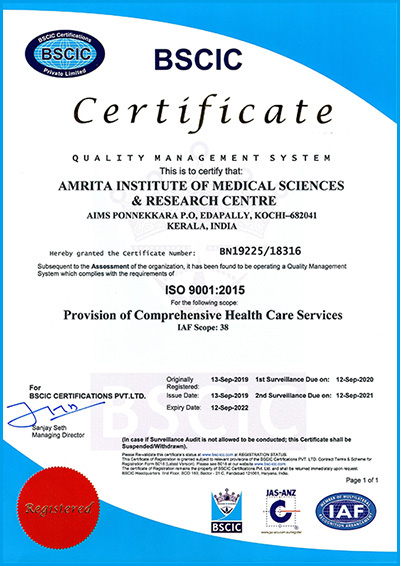
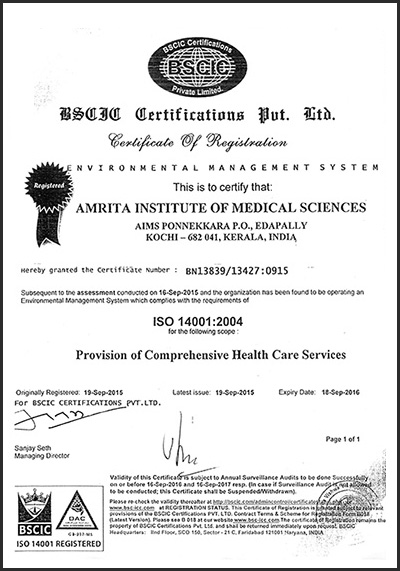
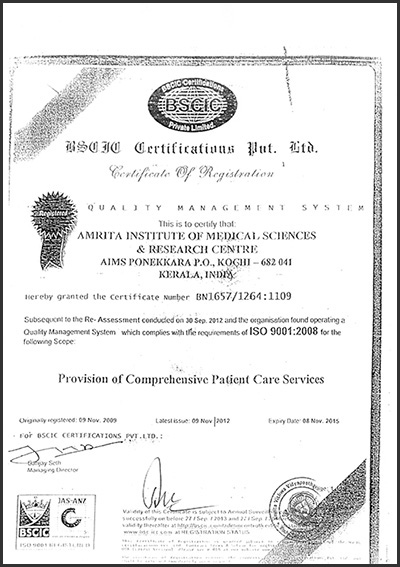
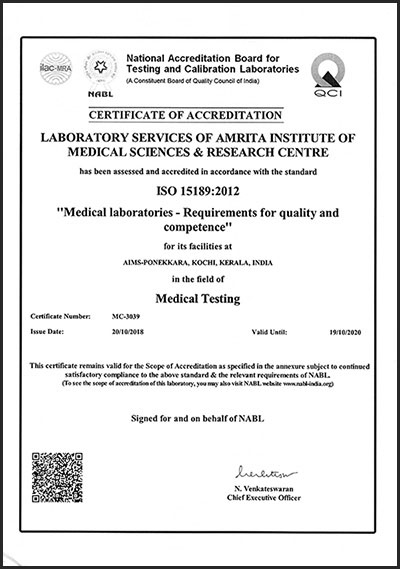
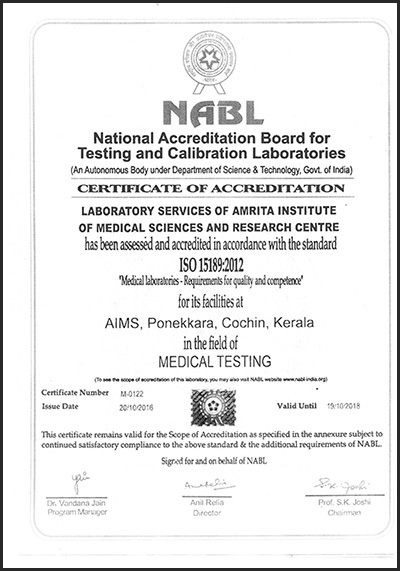
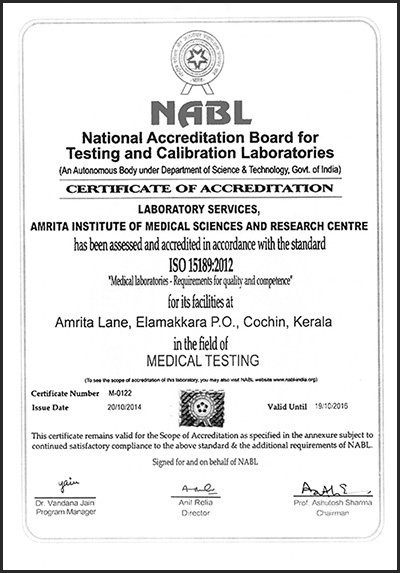
The B. Pharm. and B. Tech. programs of Amrita Vishwa Vidyapeetham, got reaccredited by the National Board of Accreditation (NBA). The National Board of Accreditation (NBA) is one of the two major bodies responsible for accreditation of higher education institutions in India. NBA accredits technical programmes, such engineering and management programmes and is a full member of the Washington Accord. More

| Programs | Accreditation Validity |
|---|---|
| B. Tech. Aerospace Engineering | 30.06.2022 |
| B. Tech. Chemical Engineering | 30.06.2022 |
| B. Tech. Civil Engineering | 30.06.2022 |
| B. Tech. Electrical & Electronics Engineering | 30.06.2022 |
| B. Pharm. | 30.06.2021 |
Amrita Institute of Medical Sciences has been granted NABL accreditation for all its laboratories.
NABL is a Constituent Board of Quality Council of India. NABL has been established with the objective to provide Government, Industry Associations and Industry in general with a scheme for third-party assessment of the quality and technical competence of testing and calibration laboratories.
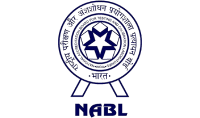

| Lab Name | Laboratory Services of Amrita Institute of Medical Sciences and Research Centre |
| Address | AIMS-Ponekkara, Kochi, Kerala, India |
| Field | Medical |
| Discipline | Clinical, Biochemistry, Clinical Pathology, Cytopathology, Genetics, Histopathology, Haematology & Immunohaematology, Microbiology & Serology, Molecular Testing |
| Certificate No. | MC-3039 |
| Issue Date | 20/10/2018 |
| Valid Upto | 19/10/2020 |
| Extended Upto | 19/10/2021 |
Association to Advance Collegiate Schools of Business (AACSB) announces that Amrita Vishwa Vidyapeetham has earned accreditation for its Amrita School of Business. Founded in 1916, AACSB is the longest-serving global accrediting body for business schools, and the largest business education network connecting students, educators, and businesses worldwide. More
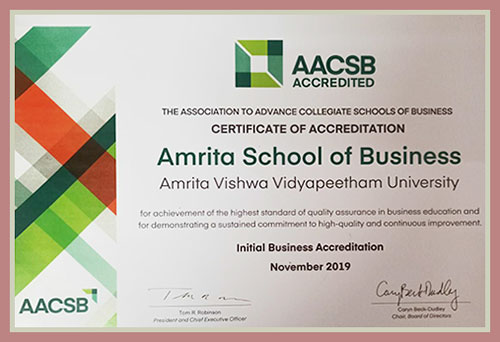
Amrita Vishwa Vidyapeetham, Coimbatore Campus has been awarded the Number One Rank in the ‘Technical Institutions’ category in the Swachhta Rankings 2017 & 2018 released by the Ministry of Human Resource Development, Government of India.
This ranking is based on a sustainability audit focusing on campus greenery, cleanliness and maintenance, toilet adequacy in campus, tree planting and community outreach in promoting Swachh culture.
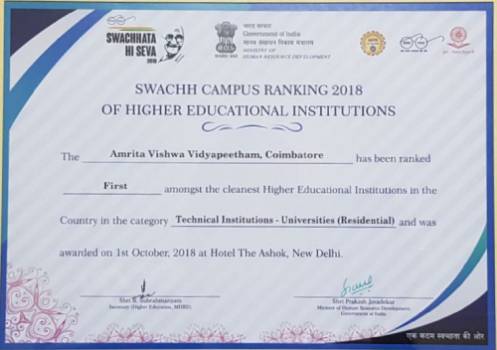

Welcome to Amrita Vishwa Vidyapeetham policies documents page. The goal of these policies are to include administrative policies and procedures that have general applicability throughout the university. As each policy is approved it will be made available to this webpage.
A university policy is a document that (1) states the university's position on a particular issue, and (2) includes procedures for compliance. A university policy is defined by all of the following criteria:
Amrita University formally approves, issues, and maintains in a consistent format, official university policies in a central policy library. Individuals engaged in developing and maintaining university policies must follow the requirements outlined in this document for drafting, approving, revising, and withdrawing university policies.
Dr. Raghu Raman. Ph.D, MBA
(UC Berkeley)
Director, IQAC
Amrita Center for Accreditations, Rankings and Eminence
(Amrita CARE)
Amrita Vishwa Vidyapeetham, India.
care@amrita.edu
https://amrita.edu/AmritaCARE